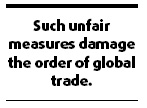Editorials
Protectionism is vicious
(China Daily)
Updated: 2010-01-25 07:54
 |
Large Medium Small |
A world economy can't afford to be enmeshed in trade protectionism measures, whether it is bogged down in a financial recession or showing signs of recovery.
While the World Bank warned last week that the global economic recovery is fragile, the United States government announced it will be investigating charges that Chinese companies are selling oil-well drill pipes in the US at unfairly low prices.
The United Steelworkers union and a group of companies from Texas and Illinois have asked for anti-dumping tariffs ranging from 429-496 percent on Chinese exports. These high tariffs, if approved, are based on unfounded guesses that Chinese producers sell their products at prices up to 80 percent lower than normal market prices, according to industrial experts.
It is the first US probe of its kind this year against Chinese products. But the US already has 82 anti-dumping duty orders in place against Chinese goods and another 12 countervailing duty orders.

Moreover, several cases that began in 2009 will be working their way to a conclusion in the coming months, including a record case involving imports of $2.74 billion of Chinese-made steel tubing and casing used in oil and natural gas production.
Although the drill pipe case has not been finalized, China and the world should be on alert against signs of rising trade protectionism that could disrupt the global economic recovery.
Calling for caution is not an exaggeration. In 1930, the US Congress approved the Smoot-Hawley Tariff Act, which allowed the country to impose extremely high tariffs on more than 20,000 imported products. Historians have agreed that it triggered the ensuing global trade wars, which almost paralyzed trade worldwide and contributed to the global economic downturn in the 1930s.
Last year, the US passed the "buy American" provision in its economic stimulus plan, signaling that it cares more about its own economic well-being than anything else, including global trade.
The large number of trade protectionist measures it has raised against other countries, including China, is simply a continuation of that egocentric philosophy.
Admittedly, the US government is under great pressure from domestic industrial interests. Economists have found that when unemployment rates rise, it is more than likely that the US will resort to protectionist measures to aid its domestic industries and protect jobs.
Between 2005 and 2007, for example, the US congress introduced 45 separate pieces of anti-China trade legislations. None of them were passed, largely because the US unemployment rate averaged as low as 4.7 percent during that period, said Stephen Roach, chief economist of Morgan Stanley. Now that rate has doubled.
But such unfair measures, while they may temporarily benefit US industries, damage the order of global trade and may even stymie the global economic recovery.
(China Daily 01/25/2010 page8)













